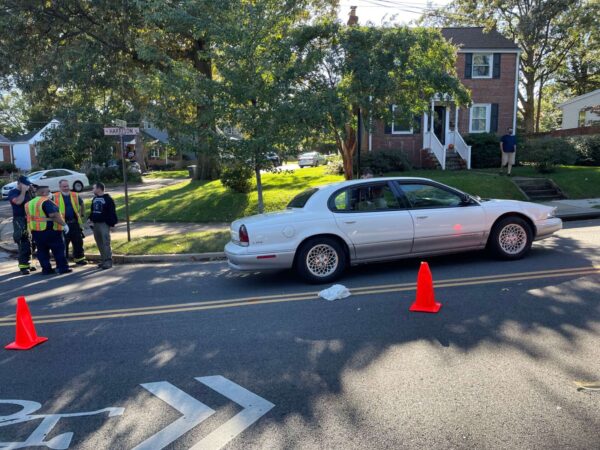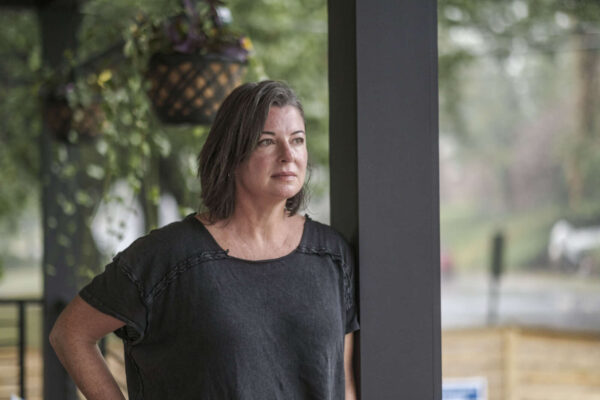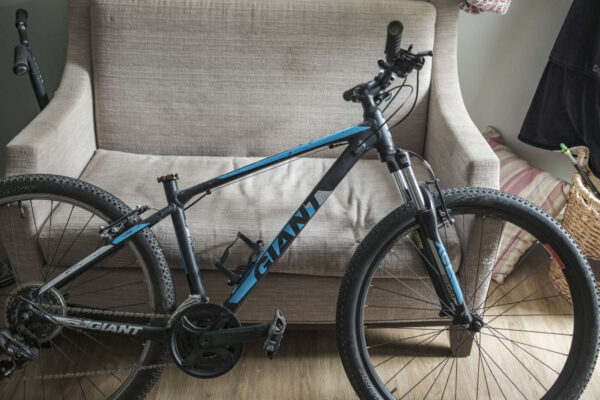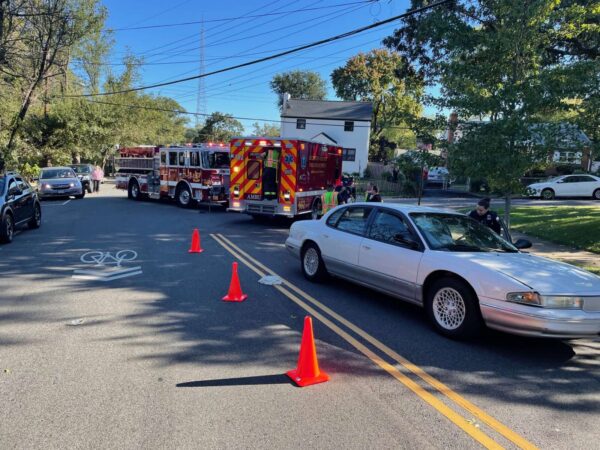
On Oct. 19, 2021, an elderly driver hit the daughter of Tara-Leeway Heights resident Heather Keppler while riding her bike.
The impact of her body cracked the windshield and she fell to the ground. She was whisked to the hospital in an ambulance where — not wanting to disturb any potential broken bones — doctors cut off a favorite running shirt and took a full-body X-ray.
Doctors said her tailbone was either broken or bruised and additional scans would confirm which injury it was. Keppler said they opted not to know, as the recovery process was the same: sitting on a donut pillow and missing her exercise routines. This pause took a toll on her daughter, then a freshman training for a regional running race.
Keppler decided to get a lawyer when one for the 86-year-old man involved called to see if she had one. The mother says in retrospect — after her experience ended in dropped charges — she is lucky she hired legal help.
“I don’t know how I would’ve found out [what] was going on,” she said.

Since June 2020, Arlington police officers have been shepherding through the legal system less-serious traffic misdemeanors: speeding, driving without a license, and so on. Before, the Office of the Commonwealth’s Attorney had a prosecutor outside Courtroom 3C — where those cases are adjudicated — to enter plea bargains.
This arrangement was imperfect, according to Arlington’s top prosecutor, Parisa Dehghani-Tafti, who just won the Democratic primary race for her seat against challenger Josh Katcher.
The assigned prosecutor often did not have “any prior knowledge of the case” and did not share pre-court-date discovery with defendants, she wrote in a 2020 memo to County Manager Mark Schwartz. This was one reason she removed prosecutors from “3C.”
After hearing from a state agency that trains prosecutors and the Virginia State Bar Ethics Counsel, it became clear her staff could not meet their obligations to share all exculpating or incriminating evidence in these cases, she argued.
Dehghani-Tafti attributed this largely to an uptick in available footage from cameras that police wear and have in their cars. Sharing all evidence would require prosecutors to review, process and disclose footage from some 40,000 cases — a tall order given current staffing levels.
“We did not come to this decision lightly, but rather after a thorough analysis of several factors,” she wrote to the Arlington County Police Department in a 2020 memo.
Three years later, she tells ARLnow that her office has kept the promises in that memo.
“We have gotten involved in every case in which our law enforcement partners have asked us to get involved, as was promised in the memo,” she said.
Keppler, however, suspects that the lack of prosecutorial presence in traffic court could explain how her daughter never got her day in court. She supported Dehghani-Tafti in her original, successful 2019 bid but this experience led her to flip for Katcher.

Dropped charges
After not hearing anything about her daughter’s case for some time, Keppler began to get worried.
Her lawyer found that subpoenas ordering the Kepplers and their assigned police officer to court on Nov. 18, 2021 were written but never issued.
“Because it was never issued, we never showed up to court,” she said. “Because no one was there, they dismissed the case.”
Like Keppler, local personal injury lawyer Jeff Jankovich says a prosecutor outside 3C could have helped the Kepplers. This person could have checked for the subpoenas and asked the judge to move the hearing date so everyone could make it.
Although Dehghani-Tafti’s memo says prosecutors were unfamiliar with the traffic cases on the docket that day, Jankovich recalls days when there were extremely experienced prosecutors who “did a pretty thorough job” of evaluating each case.
“If there were aggravating facts — an accident where someone was injured, or someone had significant prior record, even if it was minor speeding but the third, fourth or fifth offense — they were on top of that and it affected how they approached case,” he said.
Jankovich says he can respect Dehghani-Tafti’s decision to get out of traffic court due to short staffing or a belief that speeding cases are not an efficient use of time when prosecutors have a full docket of serious criminal cases. That management decision, however, has a cost.
“The reality is, when you’re down there, cases will slip through the cracks because there’s no prosecutorial presence,” he said.
But even the most “vigilant, experienced and aware” prosecutor in the office would not be able to stop a defendant from pleading not guilty, he said. If that happens, even if the defendant is found guilty, the injured party cannot use this finding of guilt in a separate civil process to sue for damages.
At this stage, he says, the presence of a prosecutor might make a “debatable” difference for victims, who are typically more concerned with building a strong case for a civil process.
“If you’re a family member of a victim, or you yourself were injured, your concern is not: ‘This person didn’t get enough points on their license,'” Jankovich said. “Your concern is, ‘I need to be compensated, and now I have to re-litigate the issue of liability because the individual did not plead guilty.”

Keppler says she cares about criminal justice reform and accountability but feels neither was achieved in her daughter’s case. She says some of her questions — why the subpoenas were never issued and whether the man who struck her daughter would have pled guilty — will never be answered.
A guilty plea, though, would have helped when she fought to have insurance cover an “outrageous” $2,000 ambulance bill. Her lawyer was able to recover some damages through a civil suit based on available evidence.
“For anyone who doesn’t have a safety net, I don’t know what would have happened to them,” she said.
Police or prosecutor, or both?
In the 2020 memo to Schwartz, outlining the problem and solutions, Dehghani-Tafti says handling the less-serious traffic misdemeanors, dubbed “3C” like the courtroom, went beyond state requirements and standard practice elsewhere.
“By statue, CA offices are only required to handle felonies,” the prosecutor told ARLnow. “Many offices, including places like Virginia Beach, only prosecute a very select number of misdemeanors like [domestic violence] cases or DWI/ DUI.”
The City of Alexandria, for instance, has long had a practice of not getting involved in non-jailable traffic infractions. Following Arlington’s lead, Fairfax County decided to sit out many misdemeanor cases in 2021 and Loudoun County signaled its intent to do the same earlier this year.
When Arlington made the change in 2020, Dehghani-Tafti said virtually no Commonwealth’s Attorney had addressed the problem of meeting evidentiary rules in the era of body-worn and in-car police cameras.
Still, she forged ahead, assuring ACPD that her office is available to help when necessary. Within a month of the decision, however, police officers and judges were raising concerns, per a July 2020 email to sworn officers shared with ARLnow.
In it, a division commander noted that “a number of officers” had questions and concerns about presenting their own cases in court and dealing with defense attorneys. Meanwhile, the courthouse raised “a number of concerns” about the quality of officer testimony in traffic cases.
The commander assured officers they would receive training. She urged them not to make deals with defense attorneys to “avoid allegations of bias or unfair treatment” and “defer to the court to reduce or amend the charge as appropriate.”
Personal injury lawyer and former Arlington police officer John Boneta says this is not a great arrangement for police.
“A police officer doesn’t need to work all night only to go to court and have that extra stress,” he said. “It’s not fair to citizens or attorneys.”
Between stifled negotiation attempts and Keppler’s dropped case, he says it is clear prosecutors should be in traffic court.
“Police officers are not lawyers. They’re not trained to present a case. They’re trained to be conduits of the facts,” he said. “You can’t negotiate with an officer. It puts everybody in an awkward position.”
Over three years, ACPD spokeswoman Ashley Savage tells ARLnow, the department has created a system to stay on top of cases and officers can handling misdemeanors competently.
“Since June 2020, our professional staff have taken on additional responsibilities to represent misdemeanors traffic court cases and demonstrated their abilities to successfully present these cases in court,” she said.
ACPD has a “Court, Licensing and Compliance Office” that handles court matters and administrative responsibilities, ensuring that everybody involved in court procedures is on the same page. Meanwhile, patrol officers have designated days in court based on their squad.
An officer not showing up to court is not always sufficient grounds for dropped charges, Savage said.
“In the event an officer is unable to attend court, the judge proceeds over the case and has discretion on if the case should be continued, dismissed or move forward without the officer present,” she said.
Keppler’s daughter is now a rising junior and healed from the injuries. She still runs for school but is not as fast as she was before the crash.
“Emotionally, it has been a bit of a harder road,” she said. “Since 2021, we’ve been having constant conversations about who you are if you’re not a runner. She’s made miles of improvements from that.”
After everything her daughter went through, Keppler says, the girl’s attitude shifted from embarassed to emboldened to have her story shared.
“Now, she realizes she’s mad because it was such a frustrating experience for all of us,” she said. “I hope [Parisa] was made a little uncomfortable and decides to change some things. There’s an unfilled role right now.”
Still, she can’t help the feeling that she is “yelling into the wind.”


